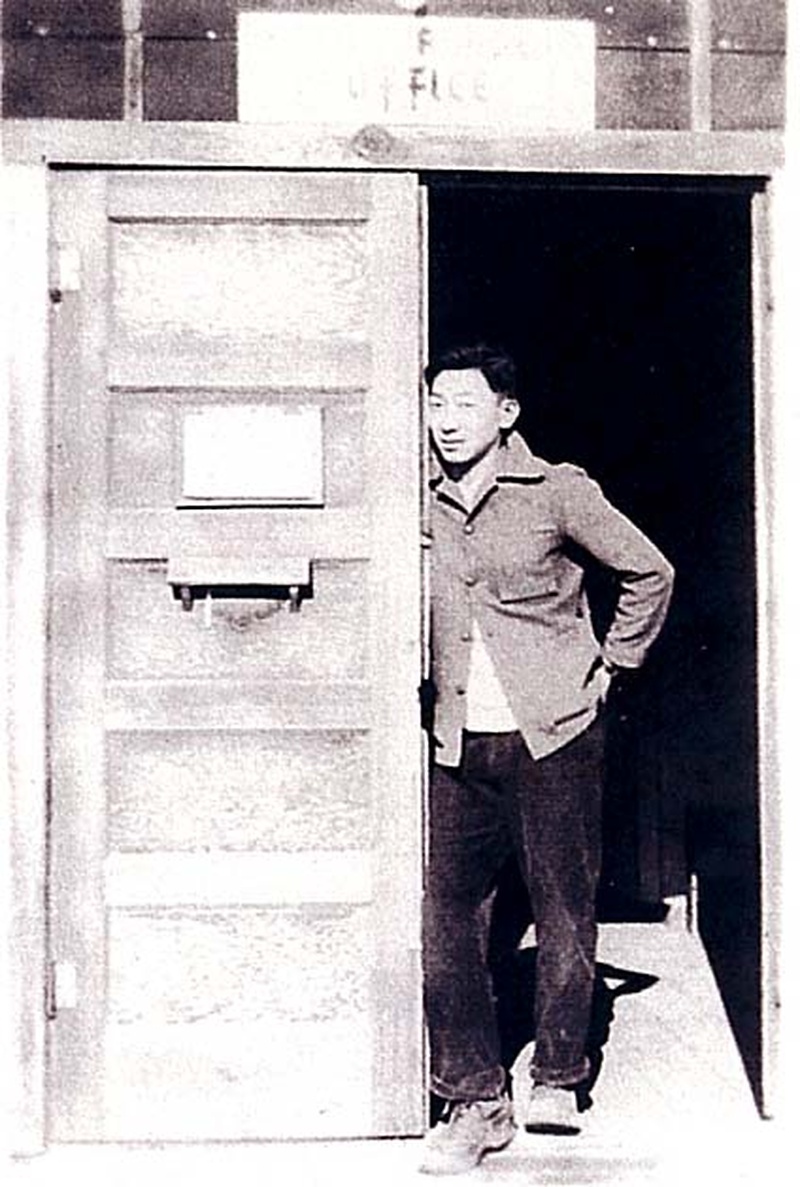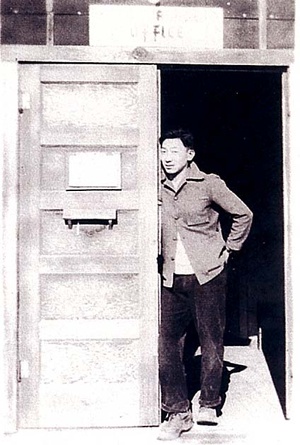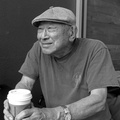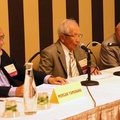I knew three block managers in camp—actually, four, as I was one myself. Though I don’t consider myself a regular block manager, since I served only a few months toward the end of camp when there was little administrative work. But recently a former resident of my block unnerved me by announcing to one and all, “He was our Block Manager!”
I didn’t know how to take that. A block manager was indeed an important functionary in the block. He was the administrative head of 250 to 300 persons; he was responsible for the smooth operation of the block; he was a mediator in the event of a dispute among the residents; and he was the chief liaison with the Administration. But for all that, he was not always the most popular or the most respected person in the block. In fact, he was often called “blockhead” behind his back.
Other duties of the block manager, many of which he delegated to his “lazy” secretary (I know because I was a secretary to two block managers), included distribution of the mail. This was one of his more pleasant tasks, as mail was associated with him and of course everyone loves mail, no matter where they are. People looked forward to the mail car every day and when it arrived, they flocked to the block office and watched eagerly while the block manager carefully inspected each piece of mail before sticking it in the right pigeon hole. Only after he was through with the entire pile would he hand over the letter or newspaper or whatever to the proper addressee.
The block manager also issued passes; helped residents when they were ill (for example, summoning the ambulance in an emergency), conducted surveys of which there were too many (I was given this task so I know); reported repairs to the proper department; issued light bulbs; sent in requisition for coal delivery; and made sure that the toilet paper in the latrines did not run out. But his most important duty, the very reason for his existence as far as the administration was concerned, was attending the weekly block managers’ meeting. This was of course obligatory and most block managers took it quite seriously—some, in fact, too seriously, to the extent of putting on a necktie before going to the meeting.
Ostensibly, the meeting was a venue for the block managers to discuss various issues and report the feelings of the residents, airing any grievances. But, when in fact, the block managers had little or no voice in the scheme of things. The Administration’s primary interest was to see that the block managers clearly understood their directives that they would then convey to the residents. In that sense, the block manager was not much more than a messenger and a convenient tool of the Administration.
During mealtime he would use a spoon and tap on a coffee mug to gain attention and announce the latest directive from the Administration to a somewhat disinterested and often put-upon group of diners.
I knew, as I’ve said, several block managers. First, there was the one who greeted us when we first arrived at Tule Lake. After a miserable all-night train ride, it was nice to have anyone welcome us. But I was a smart-alecky nineteen-year-old, suspicious of any authority figure. I wondered why this guy, who looked to be a Nisei, though a complete stranger, kept saying, “I’m your Block Manager” and telling us what to do. Well, I learned later that as part of the early contingent, he had had access to the so-called “cushy” jobs and because of his supposed bilingual ability, he was hired as a block manager and assigned to our block. I thought his Japanese when he made his announcements in the mess hall was rather stiff and textbook-like and his English wasn’t much better. As I suspected, he turned out to be a rather cold, pompous, and officious person and I never had much to do with him. During the loyalty registration he and his family were the first to move out, leaving behind his elderly parents.
The other two block managers I knew better, since I worked for them as a secretary. There was Mr. Handa, an older man, a well-educated Issei. Before becoming a block manager, he had been a warden; I remembered seeing him in a dark uniform complete with a cap, a badge, a nightstick, and leggings. Now, as a block manager, he looked more like a teacher, the Japanese language schoolteacher that he was before the war. Still, his mustache and stern demeanor always reminded me of a Prussian general. Actually, he was an easy going man who didn’t take his position too seriously; he had a curious habit of putting his feet up on the desk. That’s the kind of person he was. He let me do pretty much as I pleased, which was okay by me. He was a block manager for less than a year until he left camp, when I succeeded him. But before Mr. Handa was Mr. Sumitomo.
Mr. Sumitomo became the block manager almost by default. When the first manager and his wife, who was also his secretary, left abruptly, the positions of block manager and secretary became vacant. Two concerned block elders took it upon themselves to try to convince some people from within the block to take over, but no one was interested. That’s when Mr. Sumitomo, in a spirit of altruism, came forward. “I got no schoolin’, no qualification and I got no business even thinkin’ about it but we gotta have a block manager, no? I’ll be block manager and you be secretary,” he said with such finality that I said okay before I realized what I was doing. I guess I was taken by his spirit and I kind of liked the man. Anyway, that’s how we became a team of sorts.
Mr. Sumitomo always wore a hat. He was from Hawaii; he told me he was born in Hanapepe. Though he said he had no schooling, I knew he had been to high school. But he sure was hard on himself. “Mine too small,” he would say, referring to his penis. Now, why would he say that? He was no smaller than most guys were.
I really liked the announcements he used to make in the mess hall. I think the diners didn’t mind the interruptions either. His mixture of simple, almost childlike Japanese and Hawaiian pidgin English always seemed to amuse and charm them. But funny or not, Mr. Sumitomo was totally serious.
I guess I wasn’t much help to him. As a secretary I swept and mopped the office floor every morning, I sorted the mail when Mr. Sumitomo was away or busy. I made out requisitions as needed and I did whatever he asked me to do. What else was there? Sure, I had plenty of time to sit out front with my friends and smoke our homemades and watch the girls go by. I must confess that we undressed each of them mentally and embarrassed them so much that they held on to their dresses as they hurried by. “More bettah play cards inside, heh, Mr. Sumitomo?”
I heard Mr. Sumitomo was complaining about me to the others. “He too lazy, don’t do nottin, play cards alla time.” Yes, we did play a lot of cards. But I wasn’t into cards; it was just a game. I thought I was doing my duty keeping the fellows occupied. We played pinochle for hours on end, so much so that I have never played it since camp. Recently, I read in The New Yorker that “to play pinochle” is a euphemism for “being a philanderer.” I thought that was interesting.
Mr. Sumitomo had some odd quirks, one of which was to keep a canary in a cage. This was puzzling to me, considering our situation, but it was his business so I didn’t question him about it. Maybe he needed a diversion, a pet. He always seemed to be stressed and unhappy. Maybe he was over extended or maybe the job was getting to him. It was, after all, thankless, frustrating work. Anyway, he always appeared in the morning puffy-faced and grim-looking; it was never a good morning with him.
One day, however, he was really sick with a sinus infection and had to go to the hospital. He asked me if I would look after his canary and of course I told him “sure, don’t worry.” It was simple enough feeding and watering the bird, but one day I got careless and forgot to close the little gate to the cage and the canary was gone.
Now, Mr. Sumitomo was one of those people who re-cooked his food to suit his taste. He would bring his plate of food from the mess hall and cook it again on his hot plate; once he invited me to eat and offered me what was famously called “slop suey.” He had cooked it again using hard candy in place of sugar. Imagine finding little white pellets of hard candy in the slop suey. To wash the dishes and utensils, he always kept a bucket of water handy.
Frantically, I looked around the room for the canary, then I saw something in that bucket. “No!” I remember saying to myself. Well, it was the bird, lifeless. I picked it out of the water and slapped it a few times, trying to revive it. I guess I felt responsible for its death.
When Mr. Sumitomo came home from the hospital, of course, I had to tell him about the canary. I was quite contrite and even admitted that I might have been careless.
“Don’t worry; no can help,” he said, much to my relief.
It was soon after that that Mr. Sumitomo announced that he was quitting as block manager, that the job was making him sick. Maybe that was true, but I knew that he had other concerns. Once he had told me that he had a family in Japan, a wife and two kids in Hiroshima.
In February 1946, Mr. Sumitomo was one of 4,406 Tule Lake inmates who voluntarily left for Japan. When I went to see him off, he was barely recognizable because he was wearing three hats, one on top of the other, and extra clothing under his brown suit. That was the last time. Mr. Sumitomo and the others had gone to a country that had been totally devastated. I don’t know whether he got to see his wife and children in Hiroshima. Some time later I heard that he was working as an interpreter for the Army occupation.
Anyway, I wrote a story about it for a Japanese language class and the instructor read it to the class: how the canary escaped and drowned and how it affected me. But I didn’t explore how or why the bird fell in the water. Was it deluded by its own image in the water? Could be. Was it thirsty? How could that be? I had given it water every day. Cooped up in a cage, was it so unused to flying that even when given a chance to fly, it couldn’t—and, like a faulty plane, it had failed mid-flight? Now that’s a good possibility.
*This article was originally published in “Swimming in the American, a Memoir and Selected Writings,” San Mateo, CA, Asian American Curriculum Project, 2005.
* * *
* Hiroshi Kashiwagi will be speaking at "The Tule Lake Segregation Center: Its History and Significance" session at JANM’s National Conference, Speaking Up! Democracy, Justice, Dignity on July 4-7, 2013 in Seattle, Washington. For more information about the conference, including how to register, visit janm.org/conference2013.
© 2005 Hiroshi Kashiwagi









